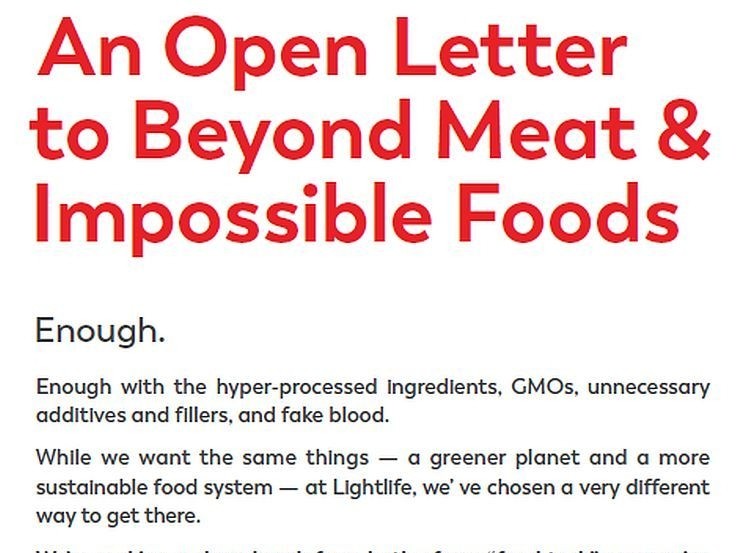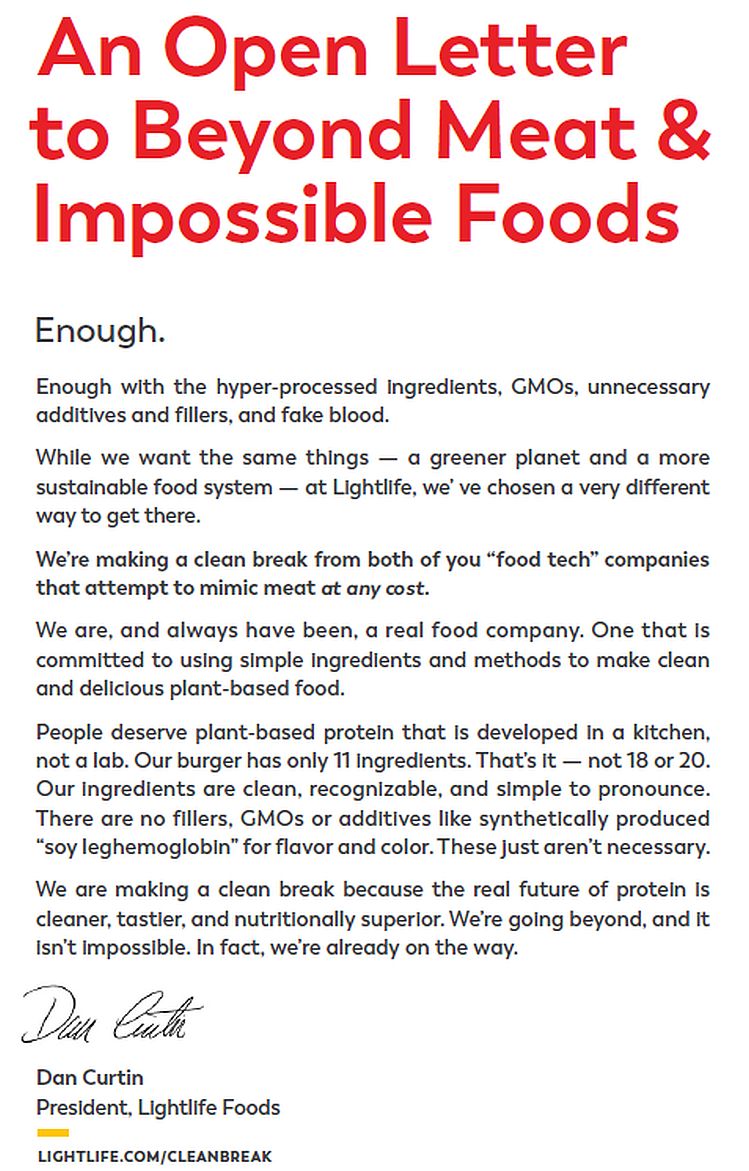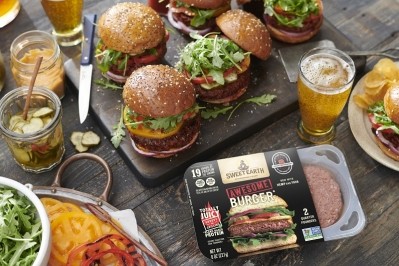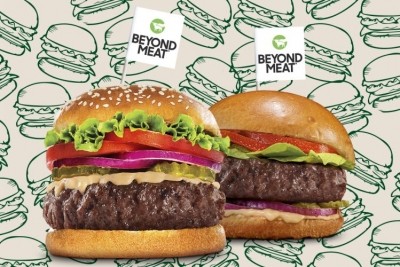Impossible Foods hits back at ‘disingenuous, desperate disinformation campaign’ as Lightlife attacks ‘hyperprocessed’ ingredients

The letter, published in The New York Times and other high-profile publications is addressed to Beyond Meat and Impossible Foods, and signed by Lightlife Foods president Dan Curtin.
He begins: “Enough with the hyper-processed ingredients, GMOs, unnecessary additives and fillers, and fake blood… We’re making a clean break from both of you ‘food tech’ companies that attempt to mimic meat at any cost.
“We are, and always have been, a real food company… People deserve plant-based protein that is developed in a kitchen, not a lab. Our burger has only 11 ingredients. That’s it — not 18 or 20. Our ingredients are clean, recognizable, and simple to pronounce.
“There are no fillers, GMOs or additives like synthetically produced ‘soy leghemoglobin’ for flavor and color…”
While some commentators argue that Lightlife’s latest burger is every bit as ‘processed’ as rivals’, albeit with a slightly shorter ingredients list (which in part reflects the fact that it doesn’t add vitamins and minerals – see box below), Lightlife said: “We are making a clean break because the real future of protein is cleaner, tastier, and nutritionally superior.”
Beyond Meat: ‘Our products are made with simple, plant-based ingredients’
Beyond Meat, whose flagship Beyond Burger has a similar set of ingredients, the same amount of protein (20g) and saturated fat (5g), more fiber and less sodium than the Lightlife burger, expressed surprise at being called out in the letter, which primarily takes aim at ingredients (soy leghemoglobin, GM soy) used by rival Impossible Foods.
A spokesperson told FoodNavigator-USA: "If Lightlife were clear on our ingredients, they would see that our food is made from simple, plant-based ingredients. With no GMOs. No synthetic additives. No carcinogens. No hormones. No antibiotics. No cholesterol.
"Our foods are designed to have the same taste and texture as animal-based meat, giving more consumers more options that are better for them and the planet."
Impossible Foods: ‘A loony concept’
Impossible Foods, meanwhile, said judging the merits of a food product based on the number of ingredients it contains and whether the average consumer can pronounce them was lazy and unscientific, and slammed the letter as a “disingenuous, desperate disinformation campaign attempting to cast doubt on the integrity of our products.”
It added: “The campaign leans on arguments typically used by the meat industry: Attack Impossible’s products not based on their quality, nutrition, wholesomeness or deliciousness, but based on the number of ingredients -- a loony concept with zero relevance to health or product quality, intended to distract consumers from the obvious inferiority of their products.”
Dr Rachel Cheatham: ‘This feels like nothing more than a PR stunt’
Dr Rachel Cheatham at food and nutrition consultancy FoodScape Group, said the 'hyper-processed' narrative about plant-based meats might be gaining traction in some circles, but said many consumers were "giving more clean label leeway to meat and dairy alternatives due to the believed sustainability trade-offs."
And while Lightlife's open letter might encourage greater scrutiny of product labels, it's questionable whether the comparisons it is inviting will be as meaningful to consumers as Curtin anticipates, she predicted:
“Because Lightlife's offering still contains ingredients that staunch clean label advocates have issues with such as modified cellulose and natural flavors, this messaging speaks to a narrow audience at best and will do little to broadly boost trust among consumers.”
‘Lightlife is remarkably similar to Beyond Meat’
Ultimately, she said, “This open letter feels like nothing more than a PR stunt... At the end of the day, Lightlife is differentiated from Impossible Foods thanks to avoiding bioengineered ingredients such as soy leghemoglobin, but Lightlife is remarkably similar to Beyond Meat.
"Regardless, the strategic focus should be on building a credible relationship directly with consumers, not picking public battles with the competition.”
Lightlife: 'Our approach is consumer-centric at its core'
Asked to respond to its critics, a Lightlife spokesperson told FoodNavigator-USA that its approach is "consumer-centric at its core...
"We conducted a comprehensive plant-based protein research study so we could better understand exactly what people want from plant-based protein. The findings from this study show people want simple ingredients and we did just that... Our Lightlife Plant-Based Burger has no soy, potato starch, corn starch or maltodextrin like some of our competitors."
'You could easily make our Lightlife Plant-Based Burger using a kitchen blender, mixer and your stove top'
Asked to address accusations of hypocrisy given that Lightlife’s products are also arguably highly 'processed,' the spokesperson added: "From start to finish, our burger is less processed than the other plant-based burgers in the meat section. In fact, assuming you have all the ingredients at home, you could easily make our Lightlife Plant-Based Burger using a kitchen blender, mixer and your stove top."
The company did not respond to questions about what was wrong with GM soy, or soy leghemoglobin produced via microbial fermentation, but said: "We've used non-GMO ingredients for more than 15 years, a factor that’s increasingly important to our consumers."
What are plant-based burgers made from?
While some brands in the burgeoning category contain more ingredients than others, the basic formulation of the 'next-generation' refrigerated burgers is fairly similar, with most combining extruded plant protein (soy, peas, wheat) with plant-based oils such as coconut and canola, methylcellulose for binding,* various seasonings, natural colors, and in some cases starch.
Impossible Foods' recipe is distinct in that it also includes soy leghemoglobin - a protein that carries the iron-containing molecule ‘heme,' which it says "makes meat taste uniquely like meat" . While leghemoglobin is found in nodules attached to the roots of nitrogen-fixing plants such as soy, Impossible Foods produces it on a commercial scale in fermentation tanks via a genetically engineered yeast.
The yeast feeds on sugar from plants and produces leghemoglobin with a fraction of the environment footprint of field-grown soy (the final product contains no live yeast).
Impossible Foods received a letter from the FDA in 2018 confirming the agency had no additional questions to challenge the company’s determination that its flagship ingredient is generally recognized as safe (GRAS).
*Methylcellulose is created from cellulose (a natural substance found in plant cells) through heating with a caustic (alkali) solution and treatment with methyl chloride. The end product is a white odorless powder with attractive gelling and emulsifying capabilities that is soluble in cold water, forms a gel at higher temperatures and holds plant-based meat products such as burgers together as they cook, as well as boosting succulence and juiciness. However, many companies are working to remove it owing to the consumer-unfriendly name.
LIGHTLIFE BURGER: Water, pea protein, canola oil, coconut oil, natural flavors, less than 2% modified cellulose (from plant fiber), sea salt, vinegar, beet powder (color), cane sugar, cherry powder (to promote color retention).
BEYOND BURGER: Water, pea protein, expeller-pressed canola oil, refined coconut oil, rice protein, natural flavors, cocoa butter, mung bean protein, methylcellulose, potato starch, apple extract, pomegranate extract, salt, potassium chloride, vinegar, lemon juice concentrate, sunflower lecithin, beet juice extract (for color).
IMPOSSIBLE BURGER: Water, soy protein concentrate, coconut oil, sunflower oil, natural flavors, 2% or less of: potato protein, methylcellulose, yeast extract, cultured dextrose, food starch modified, soy leghemoglobin, salt, mixed tocopherols (antioxidant), soy protein isolate, vitamins and minerals (zinc gluconate, thiamine hydrochloride (vitamin b1), niacin, pyridoxine hydrochloride (vitamin b6), riboflavin (vitamin b2), vitamin b12).
SWEET EARTH (NESTLÉ) AWESOME BURGER: Water, textured pea protein, coconut oil, wheat gluten, natural flavors, canola oil, distilled vinegar, 2% or less of methylcellulose, sea salt, fruit and vegetable juice concentrate (color), dried malted barley extract, corn sauce (cultured corn starch, salt, water).
PURE FARMLAND (SMITHFIELD) BURGER: Water, soy protein concentrate, coconut oil, canola oil, isolated soy protein, less than 2% of spice, natural flavorings, roasted garlic powder, dehydrated garlic, onion powder, salt, sunflower oil, soy fiber, sugar, red beet juice concentrate (for color), paprika oleoresin (for color), yeast extract, cultured dextrose, maltodextrin (from corn, tapioca, and potato), methylcellulose, citric acid, soy lecithin
GARDEIN ULTIMATE BURGER: Water, textured pea protein, textured wheat protein, wheat gluten., wheat starch, palm oil, coconut oil, vital wheat gluten, contains 2% or less of: methylcellulose, malt extract, natural flavors, garlic powder, organic sunflower oil, sea salt, onion powder, beet juice (color added), citric acid, ascorbic acid
HORMEL HAPPY LITTLE PLANTS BURGER: Water, soy protein concentrate, soybean oil, isolate soy protein (contains soy lecithin), contains 2% of less of methylcellulose, caramel color, hydrolyzed soy protein, yeast extract, natural flavor (contains organic refined coconut oil), beet powder (for color), onion powder, salt, spices









!["Chicken is a massive opportunity [in the plant-based meat category]" Picture: Lightlife Foods](/var/wrbm_gb_food_pharma/storage/images/_aliases/wrbm_medium/publications/food-beverage-nutrition/foodnavigator-usa.com/article/2021/06/15/lightlife-president-predicts-more-segmentation-in-plant-based-meat-defends-real-food-stance-it-was-not-a-pr-stunt/12565817-1-eng-GB/Lightlife-president-predicts-more-segmentation-in-plant-based-meat-defends-real-food-stance-It-was-not-a-PR-stunt.jpg)















